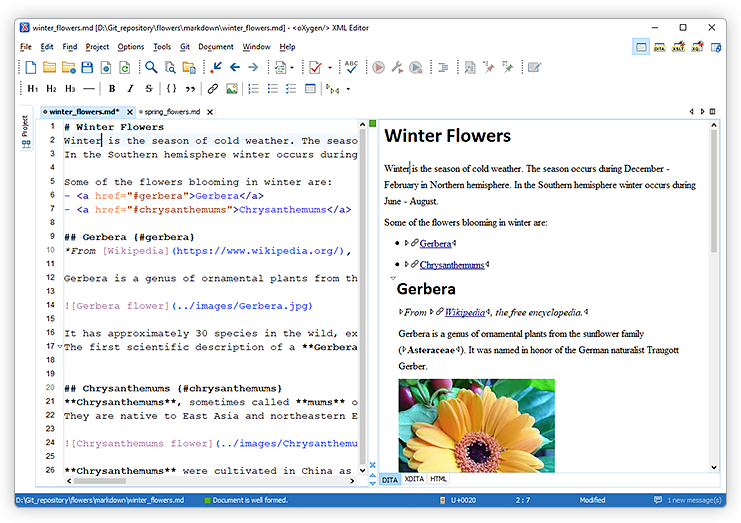- Subscribe on Youtube: To watch more videos like this, go to In this episode.
- Any markdown file in your repository will display in your Github Pages website. You just have to use the same path to access it and replace the.md extension by.html. To make links between your Markdown files just use a relative path to the other Markdown file.
- Markdown To Documentation Website
- Markdown Link To Website
- Markdown Hyperlink To Website
- Markdown Website Examples
Site navigation bars include the site’s title, an optional logo, top-level links to articles, and if need be drop-down menus that include links to several articles. For example: Elements of the site navigation bar are specified within the navbar section of the site.yml file. For example, here is the YAML that was used to create the.
Introduction
This little guide demonstrate how to turn any Github repository with a bunch of Markdown files into a simple website using Github Pages and Jekyll.
- You don’t need to use the command line or anything other than your browser.
- It doesn’t require any knowledge in Jekyll.
- It’s completely compatible with any bunch of markdown files you already have in any existing repository without any modification to those files. That includes the basic
README.mdalmost all repositories contain. - The markdown files will remain just as readable and usable in Github than in your website.
In fact this guide uses the same configuration and can be read both in Github and in Github Pages, at your preference:
Step by step instructions
Determine the repository where you want to activate Github Pages
You can of course create a new repository if you want.
Create the _config.yml file
That file should be created on the root of your repository. Here is some content to copy-paste in it:
It’s basically just a few tuning of Github Pages’ default configuration to have a better handling of Markdown files.
Activate Github Pages in your repository configuration
On the Github page of your project go into Settings > Options > Github Pages:
In the Source option, select master branch then Save:

You must also choose a theme:

That’s it! Now you can juste use the link provided by Github to access you website:
Usage guide
- Any markdown file in your repository will display in your Github Pages website. You just have to use the same path to access it and replace the
.mdextension by.html. - To make links between your Markdown files just use a relative path to the other Markdown file. The configuration you copy pasted in your
_config.ymlprovides a plugin to convert those URLs. So your Markdown files will have correct links both in Github and Github Pages. - The index page of your website can be a
index.mdfile or aREADME.mdfile. If both exists theindex.mdfile has priority. - You should be able to use any Github Flavored Markdown.
Known differences between Github and Github Pages
- No automatic links with Github Pages. The Github Markdown renderer can automatically detect a simple copy-pasted link and make it a clickable link. Github Pages doesn’t propose a feature to reproduce that behavior, so you’ll have to braces your links with the
[]()syntax.

Recipes

Since the purpose of this guide is to demonstrate how to publish multiple Markdown files as a website but I don’t have much more to say I will propose you some delicious recipes instead:
Other Github Pages related projects
I’m a fan of Github Pages for the possibilities it offers to anyone to publish a website for free. I have multiple projects that could be of interest if that’s your case too:
Contributing
See the Contribution Guide.
License
See the License File.
What is Markdown?
It’s a plain text format for writing structured documents, based on formatting conventions from email and usenet.
Who created Markdown?
It was developed in 2004 by John Gruber in collaboration with Aaron Swartz. Gruber wrote the first markdown-to-html converter in Perl, and it soon became widely used in websites. By 2014 there were dozens of implementations in many languages.
Why is CommonMark needed?
John Gruber’s canonical description of Markdown’s syntax does not specify the syntax unambiguously.
In the absence of a spec, early implementers consulted the original Markdown.pl code to resolve these ambiguities. But Markdown.pl was quite buggy, and gave manifestly bad results in many cases, so it was not a satisfactory replacement for a spec. Markdown.pl was last updated December 17th, 2004.
Because there is no unambiguous spec, implementations have diverged considerably over the last 10 years. As a result, users are often surprised to find that a document that renders one way on one system (say, a GitHub wiki) renders differently on another (say, converting to docbook using Pandoc). To make matters worse, because nothing in Markdown counts as a “syntax error,” the divergence often isn’t discovered right away.
There’s no standard test suite for Markdown; MDTest is the closest thing we have. The only way to resolve Markdown ambiguities and inconsistencies is Babelmark, which compares the output of 20+ implementations of Markdown against each other to see if a consensus emerges.
We propose a standard, unambiguous syntax specification for Markdown, along with a suite of comprehensive tests to validate Markdown implementations against this specification. We believe this is necessary, even essential, for the future of Markdown.
That’s what we call CommonMark.
Who are you?
We’re a group of Markdown fans who either work at companies with industrial scale deployments of Markdown, have written Markdown parsers, have extensive experience supporting Markdown with end users – or all of the above.
- John MacFarlane, jgm@berkeley.edu
- David Greenspan
- Vicent Marti, vicent@github.com
- Neil Williams, neil@reddit.com
- Benjamin Dumke-von der Ehe
- Jeff Atwood, jatwood@codinghorror.com
How can I help?
Exercise our reference implementations, or find a community implementation in your preferred environment or language. Provide feedback!
If a CommonMark implementation does not already exist in your preferred environment or language, try implementing your own CommonMark parser. One of our major goals is to strongly specify Markdown, and to eliminate the many old inconsistencies and ambiguities that made using Markdown so difficult. Did we succeed?
Where can I find it?
spec.commonmark.org
The CommonMark specification.
Markdown To Documentation Website
code.commonmark.org
Reference implementation and validation test suite on GitHub.
talk.commonmark.org
Public discussion area and mailing list via Discourse.
commonmark.org/help
Markdown Link To Website
Quick reference card and interactive tutorial for learning Markdown.
spec.commonmark.org/dingus/
Live testing tool powered by the reference implementation.
Markdown Hyperlink To Website
When is the spec final?
The current version of the CommonMark spec is quite robust after many years of public feedback.
There are currently CommonMark implementations for dozens of programming languages, and the following sites and projects have adopted CommonMark:
Markdown Website Examples
- Discourse
- GitHub
- GitLab
- Qt
- Stack Overflow / Stack Exchange
- Swift
